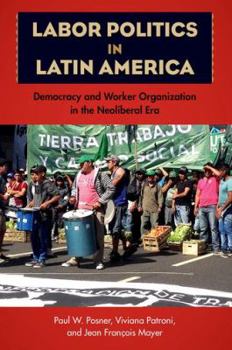Labor Politics in Latin America: Democracy and Worker Organization in the Neoliberal Era
In recent decades, Latin American countries have sought to modernize their labor market institutions to remain competitive in the face of increasing globalization. This book evaluates the impact of such neoliberal reforms on labor movements and workers' rights in the region through comparative analyses of labor politics in Chile, Mexico, Argentina, Brazil, and Venezuela. Using these five key cases, the authors assess the capacity of workers and working-class organizations to advance their demands and bring about a more just distribution of economic gains in an era in which capital has reasserted its power on a global scale. In particular, their findings challenge the purported benefits of labor market flexibility--the freedom of employers to adjust their workforces as needed--which has been touted as a way to reduce income inequality and unemployment. In-depth case studies show how flexibilization as well as privatization, trade liberalization, and economic deregulation have undermined organized labor in all of these countries, leading to the current internal fragmentation of unions and their inability to promote counterreforms or increase collective bargaining. This assessment concludes that even with substantial variation among countries in how reforms have been implemented, most workers in the region have experienced increasing precarity, informal employment, and weaker labor movements. This book provides vital insights into whether these movements have the potential to regain influence and represent working people's interests effectively in the future.
Format:Hardcover
Language:English
ISBN:1683400453
ISBN13:9781683400455
Release Date:September 2018
Publisher:University of Florida Press
Length:274 Pages
Weight:1.26 lbs.
Dimensions:0.8" x 6.0" x 9.0"
Customer Reviews
0 rating





